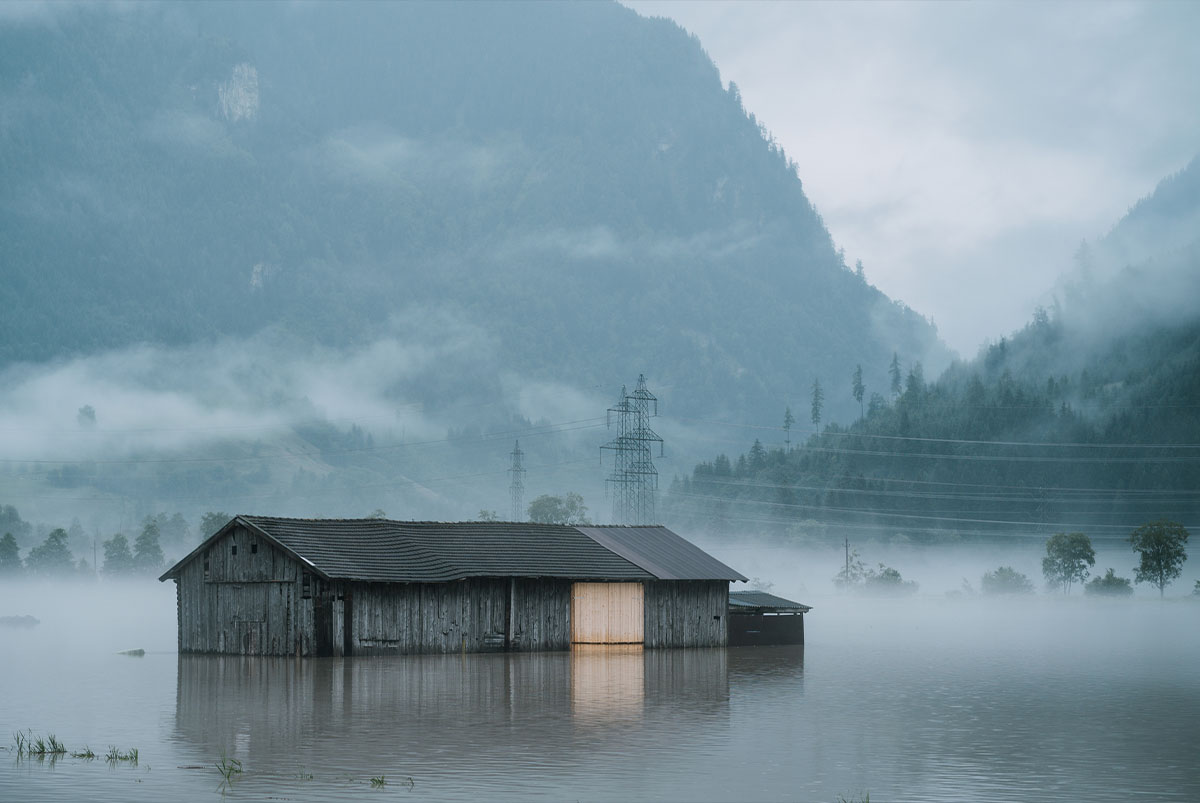Ready To Buy a Home?
Get Approved to Buy a Home
Rocket Mortgage® lets you get to house hunting sooner.
Owning a home comes with risks, which is exactly why we buy homeowners insurance. But standard homeowners insurance policies don’t cover flood damage. So what happens if you want to buy a home in a flood zone?
A flood zone is an area with an increased risk of flooding. Keep reading to learn more about flood zones, how to check if a home is in a flood zone and what you need to know before buying a home in a flood zone.
What Is a Flood Zone?
A flood zone is a geographic area designated by the Federal Emergency Management Agency (FEMA), an organization that operates within the U.S. Department of Homeland Security. FEMA designates flood zones and creates flood maps to identify areas at greater risk of flooding.
FEMA classifies flood zones based on an area’s likelihood to experience flooding. There are three different classifications:
- Special flood hazard area (SFHA): SFHAs are areas where there is at least a 1% chance of flooding each year (also known as the base flood or 100-year flood). SFHAs are labeled by zones beginning with the letters A or V (including Zone AE, Zone AO, Zone AH, Zones A1-A30, Zone A99, Zone AR, Zone AR/AE, Zone AR/AO, Zone AR/A1-A30, Zone AR/A, Zone V, Zone VE and Zones V1-V30).[1] [2]
- Moderate flood hazard area: These zones are labeled as Zone B or Zone X and are shaded on maps. Moderate flood hazard areas represent locales where the flood risk is between 0.2% and the 1% base flood limit.[1] [2]
- Minimal flood hazard area: Minimal flood hazard areas have less than a 0.2% chance of flooding every year. Minimal flood hazard areas are labeled as Zone C or Zone X and are clear or unshaded on maps.
You can use the FEMA Flood Map Service Center to explore flood maps and find out if a property is located in a flood zone.
Why do flood zones matter?
Floods are the most common and costly extreme weather events in the U.S. Around 90% of natural disasters involve flooding. Even in moderate- to low-risk flood zones, the likelihood of flooding is significant. Flooding in these areas accounts for 25% – 30% of all flood insurance claims.[3] [4]
From 1970 – 2018, the National Flood Insurance Program (NFIP) has received over 2.4 million claims and made over $70 billion in payments.[4] [5] In recent years, damage from flooding has only grown more severe.
Over the last decade, flood losses have cost Americans an average of $2.4 billion each year.[4] The NFIP has paid out billions of dollars to cover flood damage, most notably in the aftermath of Hurricane Sandy in 2012 ($8.8 billion), Hurricane Harvey in 2017 ($8.9 billion) and Hurricane Katrina in 2005 ($16.26 billion).[6]
What Are the Risks of Buying a Home in a Flood Zone?
The disadvantage of buying a home in a flood zone is that you’ll have to contend with the increased risk of property losses due to flooding. Even in a moderate- to low-risk flood zone, the risk of flood damage is still very real. In fact, flooding can happen in any area, including areas that aren’t designated flood zones.
Flood damage could be significant
It doesn’t take much water to cause significant damage to your home. Worst of all, water damage can continue to rear its ugly head in the form of mold and mildew long after the water is gone.
Water in your home can affect everything from flooring and drywall to electrical systems and appliances. According to FEMA, a single inch of water can cause $25,000 in damage to your home.[7]
Flood insurance will cost more
Flood insurance is an additional cost you’ll be responsible for if you own a home in a flood zone. With the weather becoming more severe and flooding becoming more common,[8] the cost of flood insurance is on the rise, so you can expect to pay more to keep your home insured.[9]
Fortunately, the annual cost of flood insurance is far less than the cost of paying out of pocket for repairs in the event of a loss or damage. Remember to factor flood insurance into your budget if you’re thinking about buying a home in a flood zone.
Need more info on flood insurance? We’ve already covered the ins and outs of the program for you.
Selling might not be easy
When you’re ready to sell your home, you may have a tough time finding a buyer. And your home may sell for less than a comparable home in a nearby area that’s not in a flood zone.[10]
What Are the Steps To Getting a Mortgage in a Flood Zone?
Getting a mortgage for a house in a high-risk flood zone works a lot like getting a mortgage for a house in a low-risk flood zone. But the lender will likely require the homeowner in the high-risk area to buy flood insurance. A lender may not require flood insurance for a home in a low-risk area, but they will likely recommend buying it.
If you’re buying a home in an SFHA with a government-backed mortgage – a U.S. Department of Agriculture (USDA), Federal Housing Administration (FHA) or Department of Veterans Affairs (VA) loan – you’re legally obligated to purchase flood insurance.[11] Buyers with conventional loans (loans backed by Fannie Mae and Freddie Mac) are also required to purchase flood insurance if the home is in an SFHA.[12]
If you’re looking at homes in moderate- to low-risk flood zones, ask your lender if you’ll need to buy flood insurance.
How To Find Out if Your House Is in a Flood Zone
The easiest way to find out if your house is in a flood zone is by entering the address into FEMA’s Flood Map Service Center search tool.
Questions To Ask Before Buying Property in a Flood Zone
A home’s flood zone designation tells you how likely it is the property will experience flooding. Homes in an SFHA are at the highest risk of flooding.
Many states have laws requiring home sellers to complete a Seller’s Disclosure. The disclosure contains information about the condition of a property, including any prior flooding.
Individual homeowners or communities can take measures to mitigate flood risk. Find out if there are floodgates, levees or dams protecting the area. Ask if there is a floodwater diversion route.
You’ll also want to know if the home has had any updates to manage flooding, such as stilts, a sump pump, backflow valves and raised electrical or HVAC systems.
Only you can answer that question. Now that you understand the risks, ask yourself whether buying a home in a high-risk area is worthwhile.
Make Sure Your Dream Home Doesn’t Put You Underwater
Buying a home in a flood zone comes with some added risks, which is a big part of the reason the National Flood Insurance Program exists.
Any home can experience flooding. While properties in high-risk flood zones have a higher chance of flooding, they can still make great homes. Before buying in a flood zone, do your homework, budget accordingly and understand the risks.
Take the first step toward buying a home.
Get approved. See what you qualify for. Start house hunting.
The Short Version
- A flood zone is a geographic area designated by the Federal Emergency Management Agency (FEMA)
- The easiest way to find out if your house is in a flood zone is by entering the address into FEMA’s Flood Map Service Center search tool
- The disadvantage of buying a home in a flood zone is that you’ll have to contend with the increased risk of property losses due to flooding
Federal Emergency Management Agency. “Flood Zones.” Retrieved August 2022 from https://www.fema.gov/glossary/flood-zones
Federal Emergency Management Agency. “How to Read a Flood Map.” Retrieved August 2022 from https://www.fema.gov/sites/default/files/documents/how-to-read-flood-insurance-rate-map-tutorial.pdf
Financial and Banking Information Infrastructure Committee. “Flooding – Our Nation’s Most Frequent and Costly Natural Disaster.” Retrieved August 2022 from https://www.fbiic.gov/public/2010/mar/FloodingHistoryandCausesFS.PDF
Federal Emergency Management Agency. “Mapping the Risk Flood Map Modernization.” Retrieved August 2022 from https://www.fema.gov/pdf/about/regions/regionv/faq_east_stlouis.pdf
Natural Resources Defense Council. “FEMA Flood Data: 2.4 Million Damage Claims and Counting.” Retrieved August 2022 from https://www.nrdc.org/experts/anna-weber/fema-flood-data-24-million-damage-claims-and-counting#
Property Casualty 360. “The most expensive U.S. flood disasters in the last 40 years.” Retrieved August 2022 from https://www.propertycasualty360.com/2020/05/28/the-most-expensive-u-s-flood-disasters-in-the-last-40-years-ranked-by-nfip-payouts/?slreturn=20220705175026
Federal Emergency Management Agency. “Just One Inch of Water.” Retrieved August 2022 from https://www.fema.gov/sites/default/files/2020-05/8.5x11_1_inch_flyer.pdf
National Resources Defense Council. “Flooding and Climate Change: Everything You Need to Know.” Retrieved August 2022 from https://www.nrdc.org/stories/flooding-and-climate-change-everything-you-need-know
The New York Times. “Climate Threats Could Mean Big Jumps in Insurance Costs this Year.” Retrieved August 2022 from https://www.nytimes.com/2021/02/22/climate/flood-insurance-fema.html
American Flood Coalition. “How could rising floodwaters impact your home’s value?” Retrieved August 2022 from https://floodcoalition.org/2020/05/how-could-rising-floodwaters-impact-your-homes-value/#
Federal Emergency Management Agency. “Know Your Risk.” Retrieved August 2022 from https://www.fema.gov/flood-maps/products-tools/know-your-risk/realtor-insurance-lenders#
Fannie Mae. “Selling Guide B7-3-07, Flood Insurance Coverage Requirements (12/15/2021).” Retrieved August 2022 from https://selling-guide.fanniemae.com/Selling-Guide/Origination-thru-Closing/Subpart-B7-Insurance/Chapter-B7-3-Property-and-Flood-Insurance/1032999711/B7-3-07-Flood-Insurance-Coverage-Requirements-08-07-2019.htm?




